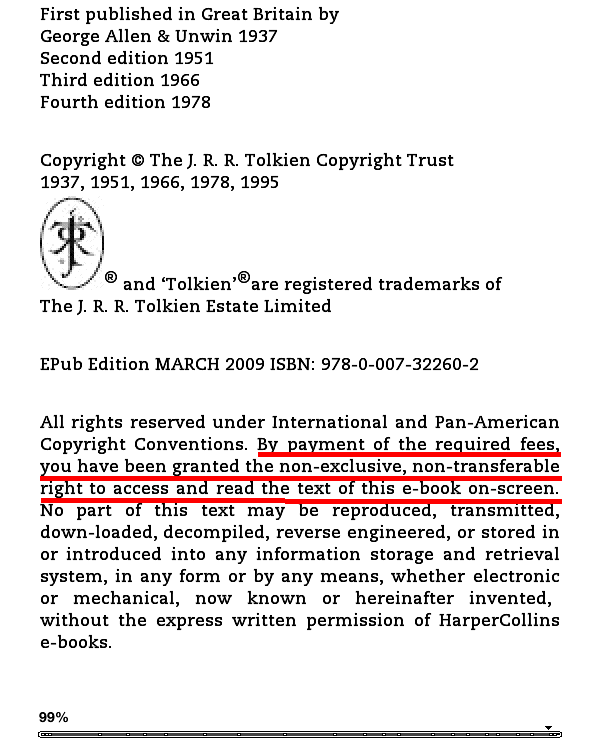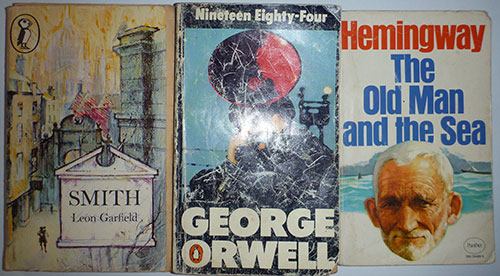What happens to the concept of ownership of books, music, DVD Movie & TV series collections etc in the shift from Analog to Digital?
As a journalist and keen observer of how technology affects society I see many upsides to digital content such as ease of use and the ability to carry around massive collections of books, music etc stored in small, light electronic devices.
However while we rush headlong into a digital content future there are several downsides that are not getting the attention they deserve.

EDITOR: This article was syndicated/re-published at the ABC Online – The Drum Unleashed opinion columns website under the title Digital purchases: nothing to hold, nothing to keep.
When I “buy” an eBook from Amazon.com or you “buy” a song from iTunes we aren’t actually buying anything at all. What we’re doing is paying for the legal licensing right to read/listen to some bits of digital information on a limited number of compatible devices.
CNET reported last week that EMI, one of the 4 largest recording industry companies in the world is suing MP3 reseller ReDigi because:
“Music buyers may be able to sell their used CDs and vinyl albums, but they’re not allowed to sell or distribute used digital tracks and albums in the same way.”
Within the next decade users of sites like Bookcrossing may only be able to swap older books that have been printed in paper versions as new books will likely be eBook only. The same will apply to 2nd hand book charity fundraisers like Lifeline Bookfest and charities like Room to Read which collects books and creates libraries in the 3rd world.
Restrictive Terms of Use
According to consumer rights organisation Choice:
“Under the World Intellectual Property Organization (WIPO) Copyright Treaty of 1996, it is illegal in most countries (including Australia since 2007) to attempt to circumvent the copyright protections built into DRM [digital rights management], even when these measures go beyond the protection of legal rights. If you wish to have true ownership over the products you buy, and use them how and when you want to, ideally you would buy products that have no DRM at all”.
As an example this is a portion of the copyright warning included in The Hobbit by JRR Tolkien eBook which I purchased to read on my Kindle:
“By payment of the required fees, you have been granted the non-exclusive, non-transferable, right to access and read the text of this e-book on screen.”
Similar terms and conditions apply to content purchased from Apple’s iTunes store. Jonathan Handel, a Los Angeles-based entertainment attorney told CNN that:
‘When we buy something from iTunes, we are paying for the license to listen to music or watch a movie on our iPhone or other Apple device. But we are not buying the product itself and so we can’t actually own it’.
Corporate censorship and remote removal of digital content that you’ve purchased are also valid issues to consider such as Amazon remotely deleting purchased copies of George Orwell’s 1984 from Kindle devices in 2009 and Apple censoring an iPad version of a web comic based on James Joyce’s famous book Ulysses.
Losing Digital Content or Access To It
New York technology attorney Mark Grossman told CNN last year that:
‘Anyone who tried to take Apple to court over a lost digital file would lose very quickly. “The argument is, you could have backed it up,” he said. “The contract clearly says ‘we are not responsible,’ and it’s firmly established in the law.”’
{{lls}}
There is no guarantee that 50 years in the future, or even 10 years in the future that the companies which we “bought” these books, music etc from will still exist.
Consumer electronics gadgets have a short lifespan due to planned obsolescence. Ebook readers, mobile phones and tablet devices can only be expected to last a few years before the battery or other parts of the hardware fails.
So if Amazon went out of business in 2020 and my Kindle’s storage got corrupted I wouldn’t be able to re-download the Kindle ebooks I’d purchased from their servers onto a new device.
Lending and Gifts
Analog printed books, music CD’s/LP’s are easy to lend, sell second hand or give away as gifts.
I have several books on my shelf that were given to me as presents by friends and teachers in primary and high school 15-20 years ago. If I wanted to I could give these books to future generations of my family with no legal issues at all.

Reading those paper books is easy but trying to open a digital file from that era is hard, especially if it’s stored in an obsolete computer document format on an obsolete storage format like 5.25″/3.5″ floppy disks.
This assumes that the storage hardware would work after such a length of time and the data had been backed up in the first place, which are topics I explored in a previous ABC The Drum Unleashed story “Digital Dark Ages?”.
If I really like an ebook I can’t move it from my computer backups folder to give it to a friend unless it is out of copyright and therefore public domain.
Unfortunately the Howard government’s 2004 Australia/USA Free Trade Agreement came at a price. A lengthy increase in the term of copyright meant that the potential benefit of many free public domain ebooks becoming available to Australians in the early 21st century was blocked.
Very limited lending of Kindle ebooks is available for US buyers but not to Australians. Even that restricted lending ability has been shown to be at the whim of Amazon who briefly blocked functionality for the 3rd party site Lendle last year.
Judging a Bookshelf
Judging a new friend’s bookshelf on your first visit to their place is human nature, don’t pretend you haven’t done it.
I’ve certainly done it because the books people read and keep as their favourites are often a strong predictor of their personality and interests in life, or at least how they want to be perceived.
One glance at a bookshelf that contains a battered Lonely Planet guide to Europe on Shoestring, glossy wilderness themed coffee table photobook and paperbacks of Robinson Crusoe reveals a lot.
The owner of those books is a traveller. They probably started when they were young and had a small budget. The glossy photobook could indicate that they’re a photographer who appreciates natural beauty and the Robinson Crusoe book that they’re more likely to go on a holiday to an isolated location than a bustling metropolis.
However within the next 5-10 years we may not be able to judge new friends by their bookshelves because it’s likely that their book collection won’t have any physical manifestation, instead living inside electronic devices like the Amazon Kindle or Apple iPad.
You may scoff but think about what’s happened to the music industry in the last 10 years. An 18 year old isn’t likely to buy a pile of CD’s and display them in their room. They’ll pirate the songs via Bit torrent or buy the song from iTunes and play it on their Apple device.
Unless you scroll through the contents of their phone when they leave it unlocked near you, the breadth and depth of their music collection will be uncertain.
With Eyes Wide Open
The shift from analog to digital for books, music, movies, DVD Movie & TV series collections etc etc is well underway and unstoppable.
However it is important that we understand the full implications of this shift, fight against onerous terms and conditions of use and question techno-utopian statements by cyberculture commentators like Kevin Kelly that “the trend is clear: access trumps possession. Access is better than ownership”.

Leave a Reply